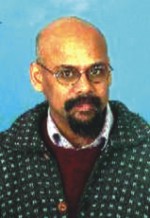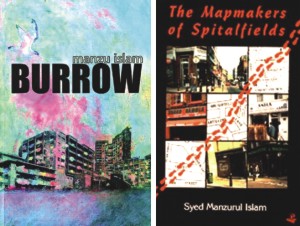|
Interview
Manzu Islam
Creator of the First Literary Map for Brick Lane
Ekram Kabir
 |
Manzu Islam |
A Bangladeshi writer Syed Manzurul Islam - he now calls himself Manzu Islam thought it was important to write about Brick Lane long before Monica Ali possibly thought of it. In some of the stories of The Mapmakers of Spitalfields, Islam describes what it is like to be Bangladeshi, especially an illegal Bangladeshi in East London. In Burrow, Manzu Islam narrates the story of an asylum seeker who 'goes to ground' in London's Brick Lane area. This novel follows the story of Tapan Ali, a young man from Bangladesh who leaves his home to study in England. When his family can no longer afford to support his education, rather than return home, Ali chooses a dangerous life on the run as an illegal immigrant.
Manzu Islam in an interview for SWM, talks about his novels and about the current project at hand.
Describe your two novels Barrow and The Mapmakers of Spitalfields.
The Mapmakers of Spitalfields arose out of my experience of living and working in the East End of London, which is the site of our Banglatown – the spiritual hub of Bangali Diaspora in the United Kingdom. In those days terrible things were happening to our community: we faced not only blatant discrimination but also daily abuse and violence. But the community also resisted; and through this resistance the community claimed its rights to be here. I wanted to bear testimony to this process, but also map the various routes that the Bangali Diaspora has taken. Moreover, this collection of stories recounts the symbolic mapping process through which we transformed the hostile territory of colonial metropolis into a home.
Burrow continues this process on a larger canvas and in a more complex way. This book also deals with, among other things, liberation of consciousness: the way entrapped souls find escape routes even in a most appalling condition.
What other works do you have in the pipeline? Are you planning any novel plot that develops in a Bangladeshi backdrop?
I have done a number of works as an academic on philosophy, ethics, and literary criticism. My Present fictional work, which is a novel, is based on my experience of our liberation war in 1971. I have been working on it for several years and already done a number of drafts; now I am completing the final draft. Provisionally the novel is called Floating in the Waterworld. I want to tell the story of our national liberation from the point of view of those who live on the margin. I want to explore what Nation, Independence, Belonging mean to them. Emotionally this project has been exhausting because it brought back so many terrible memories, which I tried to push aside for years.

You are possibly the first Bangladesh-born writer in UK to write about the Bangali community there, especially in Brick Lane. Why didn't your works create the kind of ripples in the community, as was the case with Monica Ali's Brick Lane?
I am not best placed to answer this question. As I have said before, I consider East London to be my spiritual home in the UK even though at present I don't live there. What do you consider yourself? Bangali? British? Or British-Bangali?
I am Bangali-British; British-Bangali. However, at present even these hyphenated markers of belonging are becoming meaningless.
Barrow and The Mapmakers of Spitalfields were the tales of first- and second-generation Bangalis of Britain; do you have any plans to tell the stories about the third or present generation? How do you think the present generation is different from the previous ones?
After Floating in the Waterland, I have several academic projects to complete. However, I entertain the idea of setting a novel in Mymensingh, where I grew up. I am intrigued by the third generation; and I hope searching writers will emerge from their ranks to do justice to their complex life experiences.
Do you think 9/11 and 7/7 have affected the lives of British-Bangalis in UK? Do you plan to write about it?
Yes, it has been difficult for us – the secular part of the community. On the one hand, these two events gave rise to new forms of racism and Islamophobia, which obviously do not discriminate between those who are secular and those who are not. I feel it is important to resist these new forms of racism. On the other hand, there is a growing trend among a section of our youth who are seduced by the millennial fantasies of Islamist ideology to take up extreme positions. At present, at the height of an aggressive neo-liberal capitalism, and the corresponding absence of any significant secular, progressive vision of a future, this trend is inevitable because religion seems to provide at least a stage for opposition. Despite all that, I remain optimistic. I am engaged with these issues and perhaps one day I will write about them.
Do you think Bangladeshi-origin writers have a chance in literature-dom in UK? What would be your advice to aspiring authors?
This is a difficult question because the literary establishment here expect a certain kind of work from us. They want us to pander to their agendas and fantasies. However, if you retain your integrity you will find publishers, but they may not be the high profile commercial houses.
Copyright (R) thedailystar.net 2008 |
